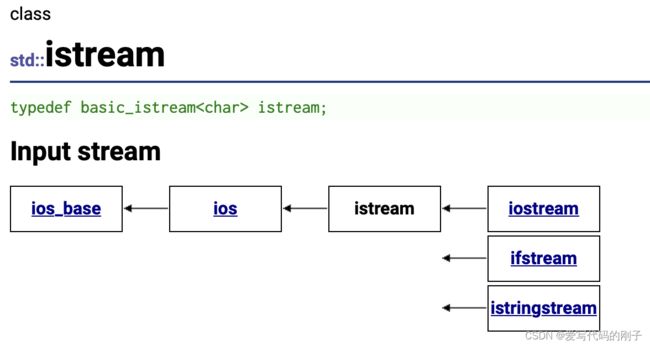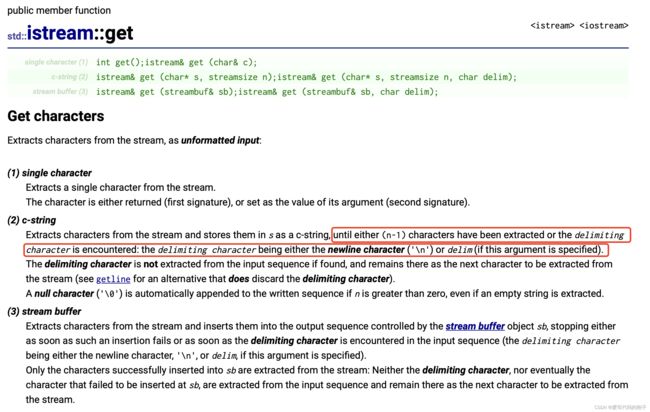【C++模拟实现】string的模拟实现
【C++模拟实现】string的模拟实现
目录
- 【C++模拟实现】string的模拟实现
-
-
- string模拟实现的标准代码
- string模拟实现中的要点
-
-
- string构造函数的实现
- 赋值运算符重载
- 迭代器的实现
- 对流插入和流提取运算符的重载
- find函数的实现
- insert函数的实现
-
-
作者:爱写代码的刚子
时间:2023.7.22
前言:本篇博客主要介绍string的模拟实现,之后会更新一系列STL中一些重要容器的模拟实现。
string模拟实现的标准代码
#pragma once
#include对于string的模拟实现,我们需要多敲代码,进一步熟悉string。作者也敲了好多次,但给出的是标准的代码不是作者敲的。
string模拟实现中的要点
string构造函数的实现
- 拷贝数据的选择strcpy还是memcpy?
一般来说,两者并没有太大的区别,但是strcpy在底层中拷贝到‘/0’就结束了,而memcpy则是内存的拷贝。但是当我们实现对运算符+=进行重载的时候会发现,如果遇到字符中含有‘/0’,如:“1234/01234”,如果使用strcpy并不会将字符串完全拷贝,所以我们选择用memcpy进行拷贝。 - 默认构造较好的实现(给缺省值)
string(const char* str = "")
:_capacity(strlen(str))
,_size(strlen(str))
{
_str=new char[_size+1];
memcpy(_str,str,_size+1);
}
赋值运算符重载
- operator的现代写法:
1.传统写法:
string& operator=(const string &s)
{
_capacity=s._capacity;
_size=s._size;
_str=new char[_size+1];
memcpy(_str,s._str,s._size+1);
return *this;
}
2.现代写法:
string& operator=(const string &s)
{
string tmp(s);
return *this;
}
void swap(string& s)
{
if(this!=&s)
{
string tmp(s);
std::swap(_str,s._str);
std::swap(_capacity,s._capacity);
std::swap(_size,s._size);
}
}
这种写法在很多场景下都可以借鉴。
迭代器的实现
- 如何区分const迭代器和非const迭代器?
- 先用typedef定义两种类型的迭代器:
typedef char* iterator;
typedef const char* const_iterator;
普通迭代器:
iterator begin()
{
return _str;
}
iterator end()
{
return _str+_size;
}
const迭代器:
const_iterator begin() const
{
return _str;
}
const_iterator end() const
{
return _str+_size;
}
对流插入和流提取运算符的重载
- 前提:
流插入和流提取的函数实现必须在类外,不然在类里面定义的函数使用时会不符合习惯,所以我们将流插入和流提取函数作为string类的友元函数。 - 对<<的重载
ostream& operator<<(ostream& _out, const bit::string& s)
{
for(auto ch : s)
{
_out<<ch;
}
return _out;
}
- 注意以上代码中变量_out的类型必须为ostream&,返回值必须为ostream&(必须加上引用),否则不能实现连续的流提取
- 对于参数s要加上const,否则传入的const参数将无法使用。
- 对>>的重载
错误写法:
istream& operator>>(istream& _cin, bit::string& s)
{
char ch;
_cin>>ch;
while(ch!=' '&&ch!='\n')
{
s+=ch;
_cin>>ch;
}
return _cin;
}
这种写法遇见空格缓冲字符时读取就会停止,并不能很好地实现流提取。
istream& operator>>(istream& _cin, bit::string& s)
{
char ch=_cin.get();
while(ch!=' '&&ch!='\n')
{
s+=ch;
ch=_cin.get();
}
return _cin;
}
find函数的实现
可以利用C语言库中的strstr实现。
还有一个易忘点:指针-指针的绝对值等于指针对应数据之间的偏移量。
size_t find (const char* s, size_t pos = 0) const
{
assert(pos<_size);
const char*ptr=std::strstr(_str+pos,s);
if(ptr)
{
return ptr-_str;
}
else
{
return npos;
}
}
insert函数的实现
注意以下代码中end的变化,以及while语句中的条件:
string& insert(size_t pos, const char* str)
{
assert(pos<=_size);
size_t len=strlen(str);
if(_size+len>_capacity)
{
reserve(_size+len);
}
size_t end=_size;
while(end>=pos&&end!=npos)
{
_str[end+len]=_str[end];
--end;
}
for(int i=0;i<len;i++)
{
_str[pos+i]=str[i];
}
_size+=len;
return *this;
}
- 如果我们只考虑到while(end>=pos)那insert的实现就错了。因为pos的类型是size_t,所以pos只能为正数,当插入的位置为0时,end将会为-1,end始终大于0,所以陷入循环中。
- 我们考虑用npos常变量来解决此问题,于是有了循环条件:while(end>=pos&&end!=npos)。
如何定义npos变量? - 可以在string类中设置一个public变量:
const static size_t npos;在类外进行初始化:const size_t string::npos = -1;也可以直接:const static size_t npos = -1;


